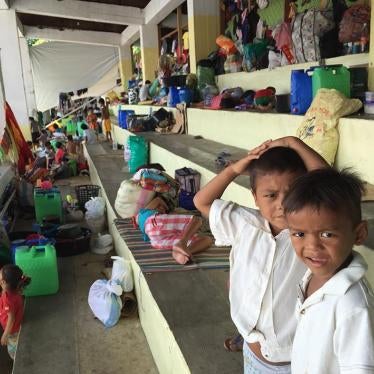Afghanistan’s President Ashraf Ghani rang in the new school year on March 22 – proclaiming “a clarion call for prosperity, stability, and mobility.”
President Ghani is right about the power of education to transform the lives of a new generation of Afghan children. But this can only happen if security forces stop using schools for military purposes and allow children back to classrooms.
In 2015, the United Nations verified 20 instances of military use of schools, 15 involving Afghan National Security Forces, including the army and police. The numbers are probably higher, with incidents taking place in much of the country, including the provinces of Kunduz, Nangarhar, Baghlan, Kunar, and Badakhshan.
Military use of schools can mean the occupation of a few classrooms or playgrounds, or a complete takeover of school facilities and grounds. In recent years, Afghan military forces have deployed weaponry in or around schools and used facilities as fixed firing positions. As a result, students are not only deprived of an education, they are also put at grave risk of attack by insurgents who then see schools as military targets.
Schools in Afghanistan have frequently been attacked by the Taliban and other insurgents. The UN documented the closure of 222 schools in 2015 as a result of attacks and threats by insurgents against schools, teachers, and students.
The UN also documented 25 casualties among students and school staff from incidents involving insurgents and government forces. These figures highlight the real risk of schools becoming targets or battlefields when they are taken over by a party to the conflict.
The military use of schools also discourages student enrollment and increases teacher absenteeism. Schooling is delayed or interrupted or students are forced to transfer – if they don’t drop out altogether. Girls often bear the brunt of these disruptions because parents are wary of sending daughters to schools occupied by armed men.
Afghanistan’s educational infrastructure is already insufficient for its needs. The military use of schools will do even more to deny Afghan children the future that Ghani trumpeted.
Afghanistan needs to take steps to protect children and their future by implementing the Safe Schools Declaration it signed in 2015. The declaration commits the government to follow guidelines for protecting schools. These guidelines include ensuring education remains uninterrupted during conflict, and urges fighting forces to refrain from using schools.
President Ghani should order his troops to immediately vacate any occupied schools and ensure respect for schools is included in military training. That will go a long way toward meeting the government’s obligation to provide a safe learning environment to the children that the president called back from winter recess today.








